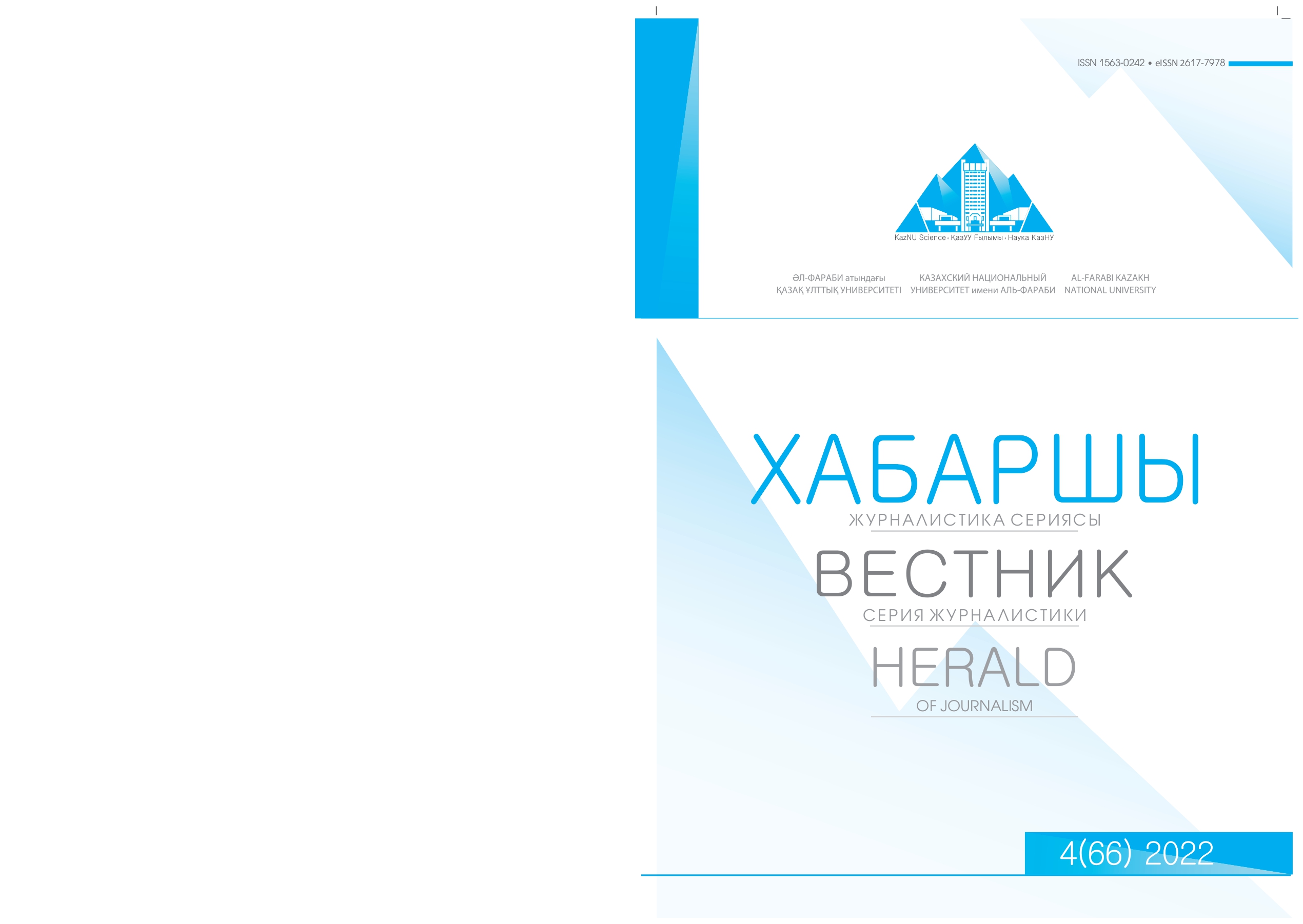SWOT analysis of current state and prospects for the development of artificial intelligence in |Kazakhstani media industry
DOI:
https://doi.org/10.26577/HJ.2022.v66.i4.05Abstract
In case of Kazakhstan, there is a push for the widespread introduction of public information services and the modernization of management based on information technologies at the official state level. These services include the introduction of electronic government (egov.kz) and gradual digitalization of the public space as in the state program “Digital Kazakhstan”. The authors view the process of digitalization as a preliminary step towards introduction and implementation of various instruments based on artificial intelligence. Aim of the study is to examine the cases of application of various AI based tools in Kazakhstani media sphere. The scientific significance is due to the relevance of the topic, the interdisciplinary direction of work. Practical significance lies in the ability to use data in several scientific fields. Authors applied method of SWOT-analysis to examine the strengths, weaknesses, potential opportunities and threats of using electronic platforms based on various artificial intelligence tools in addition to the content analysis, which allows both for quantitative and qualitative sampling. It can be concluded that strengths of AI development in Kazakhstan include comparatively high level of digitization in comparison to other countries in the region. In order for Kazakhstan to use the full potential of artificial intelligence technologies and advanced analytics, it will also require a lot of joint efforts on the part of the state, private business and residents of the country. At the population level, we can talk about the formation of habits of using technology to facilitate everyday life, as well as the development of digital methods of work. This work contributes to understanding of the usage of AI based in technologies in various socio-economical spheres on Kazakhstan. The results of the study can be used in applied work on social journalism.
Keywords: artificial intelligence, SWOT-analysis, information technology, media industry, “Digital Kazakhstan”.
References
Agrawal, A., Gans, J. S., & Goldfarb, A. (2019). Artificial Intelligence: The Ambiguous Labor Market Impact of Automating Prediction. The Journal of Economic Perspectives, 33(2), 31–50.
Ayapova, S. (2021). “Zarubezhnyye i kazakhstanskiye media ob ispol'zovanii iskusstvennogo intellekta v zhurnalistike [Foreign and Kazakh media on the use of artificial intelligence in journalism].” Al-Farabi kazakh national university. Herald of journalism, 60(2), 95-104. doi:10.26577/HJ.2021.v60.i2.10 – (In Russian)
Ayapova, S., & Skripnikova, A. (2022). Ai and human created media texts: experiment results. Al-Farabi kazakh national university. Herald of journalism, 64(2), 78-84. doi:10.26577/HJ.2022.v64.i2.08
Decree of the Government of the Republic of Kazakhstan dated December 12, 2017 N 827 "On Approval of the State Program "Digital Kazakhstan".
Eremin N.A. (2017) Digital modernization of the gas complex / N.A. Eremin, L.A. Abukova, A.N. Dmitrievsky // Actual issues of development and implementation of low-manned (remote) technologies for gas production and treatment at the fields of PJSC Gazprom: Reports of the meeting of the section "Production of gas and gas condensate" of the Scientific and Technical Council of PJSC Gazprom, Svetlogorsk, May 22–26 2017 /PJSC Gazprom. pp. 9-20.
Gelgel, Ni. (2020). Will technology take over journalism?. Informasi. 50. v-x. 10.21831/informasi.v50i2.36379.
Jacques Bughin, Jeongmin Seong, James Manyika, Michael Chui, Raoul Joshi. (2018). Notes from the AI frontier: Modeling the impact of AI on the world economy. Discussion Paper. McKinsey Global Institute.
Jalilov, A. (2020). “Gosinformzakaz «pudrit lyudyam mozgi» i «demotiviruyet SMI» [Gosinformzakaz "powders people's brains" and "demotivates the media"]. Https://Rus.azattyq.org/A/Kazakhstan-Dialogi-Adil-Dzhalilov-Interview-Journalism/30763292.Html. – (In Russian)
Karmys, G. S., Bastaubayeva, A. Z. (2018). "Swot and pest analysis of digitalization of HR processes in the civil service of Kazakhstan" Issues of State and Municipal Administration, no. 1, pp. 140-163.
Mironowa D.W. “Ot kartin mira k tsifrovomu miru? [From World-Pictures to the Digital World?]” Russian Journal of Philosophical Sciences. 2021;64(4):110-121. – (In Russian)
Petrov, D.S. (2020). “Stadii tsifrovoy transformatsii predpriyatiya [Stages of digital transformation of an enterprise]”. International scientific review, (LXVI), 39-40. – (In Russian)
Scherer, Matthew U. (2015). Regulating Artificial Intelligence Systems: Risks, Challenges, Competencies, and Strategies. Harvard Journal of Law & Technology, Vol. 29, No. 2, Spring 2016, Available at SSRN: https://ssrn.com/abstract=2609777 or http://dx.doi.org/10.2139/ssrn.2609777
Tlembaeva Zh. У. (2021). “O nekotorykh voprosakh pravovogo regulirovaniya ispol'zovaniya tekhnologii iskusstvennogo intellekta v usloviyakh tsifrovoy transformatsii [On some issues of legal regulation of the use of artificial intelligence technology in the digital transformation]”. Vestnik Voronezh State University. Series: Law, (4 (47)), 331-349. – (In Russian)
Vorobyov, A. E., Tcharo, H. (2018). Digitalization of the oil industry in Kazakhstan. Problems of subsoil use, (1 (16)), pp. 66-75.













